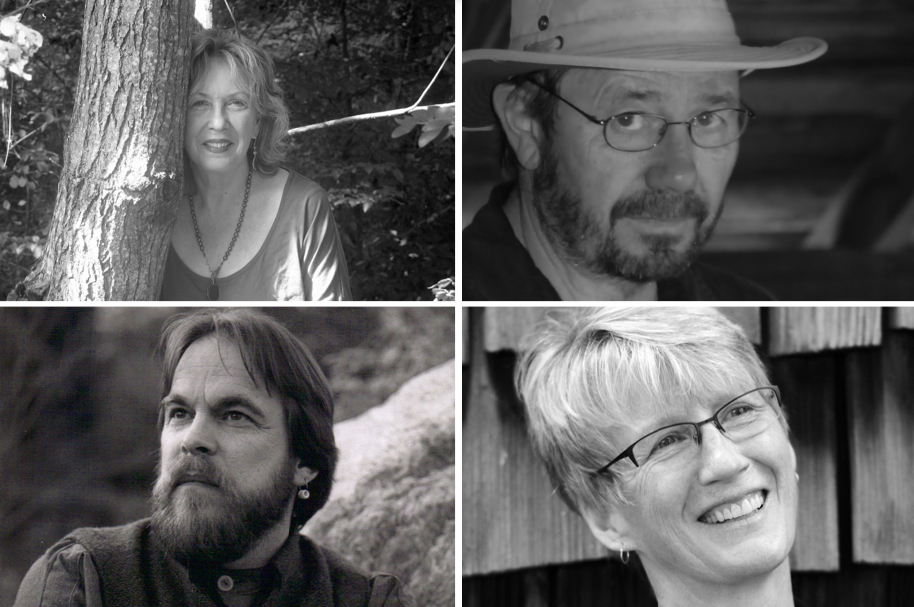Southern writing evokes a certain set of expectations, from Flannery O’Connor’s “Christ-haunted” prose to Gail Godwin’s glimpses into shifting society. But when talking about North Carolina writers, there’s one theme that returns again and again: place. From Charles Frazier’s Cold Mountain and Robert Morgan’s Gap Creek to Ron Rash’s Serena and Vicki Lane’s A Day of Small Things, each novel is set in rural and wilderness areas. And those locales are not just addresses where plot happens but are part of the action, molding and morphing the books’ human characters.
“I think it’s interesting to get the literary crowd together, to take the discussion in the direction of writing that’s based in place and what those places mean to these authors,” says project manager Mary Ellen Dendy. She, along with the Southern Appalachian office of The Wilderness Society, has produced Within the Lines: Creative Perspectives on Wilderness. The art exhibition opened in September and has held receptions and panel discussions on first Fridays. Following the September artists panel and the October interdisciplinary panel, the exhibition concludes on Friday, Nov. 7, at the HandMade in America office with a writers panel. Participants include former North Carolina poet laureate Kathryn Stripling Byer; author Wayne Caldwell; poet and translator Thomas Rain Crowe; John Lane, author and director of the Goodall Environmental Studies Center at Wofford College; writer, naturalist and historian George Ellison; and Catherine Reid, author and director of the undergraduate creative writing program at Warren Wilson College.
The wordsmiths were selected from the mental Rolodex of Brent Martin, the Wilderness Society’s Southeastern Appalachian regional director and a poet himself. “Western North Carolina is rich with writers who identify themselves and their work with deep connections to the landscape,” Martin says. “They have valuable perspectives and insights as a result that can inform long- and short-term thinking as to what matters to all of us living here and for what the future might hold.”
Had the exhibition run longer, Dendy says, there might have been a submission process. However, since each of the panels are one-offs and last just an hour, the star-studded five-author lineup makes sense. “Brent is working on questions to prompt discussion about how sense of place feeds into these writers’ work,” says Dendy. “And some questions [are] geared more specifically toward wilderness and whether they feel a sense of activism through their writing.”
“I think that, ideally, writing about place and wild places builds and activates consciousness within the reader, if he or she is open to it, as most people who care about places and communities are,” says Martin. “It creates a platform for the reader to act from within their communities and from within their own personal lives.”
The exhibition is presented in celebration of the 50th anniversary of the Wilderness Act, which created the process by which protected areas are designated. “I hope we’ll get a varied set of opinions and viewpoints on how [the Wilderness Act] is relevant in contemporary writing,” says Dendy. “It’s always interesting with people who create, to see how they perceive their own activism — whether they see themselves as activists or if they just want their work to speak for itself.”
One example of how writing has inspired conservation, says Martin, is Janisse Ray’s Ecology of a Cracker Childhood: “I think it has been instrumental in building a movement to protect longleaf pine forests in the southeastern United States.”
That spirit of advocacy shines through the visual art on display at HandMade in America by photographers Lori Kincaid and Charles Seifried, mixed-media artist Robert Cox, painter and printmaker Elizabeth Ellison, printmaker Marianne Hall and painters W.T. Dooley, Doris Gabel and Robert Johnson. “It will be interesting to hear from these [writers] whether the places they’ve explored in their writing are chosen from a sense of familiarity, or if they had more of a mission in mind when selecting wild places for their backdrops,” says Dendy.
The writers panel is intended as a complement to the visual and interdisciplinary events. Each of those mediums is a vehicle by which to inform the public about conservation efforts, and not just in the iconic landscapes of the American West, such as the Grand Canyon or Yellowstone Park. “I’d love to think this is raising the profile for wilderness in the South, and in Western North Carolina in particular,” says Dendy. “I hope people will start to picture places like Shining Rock and Linville Gorge when they think of wilderness.”
Martin adds, “I hope that attendees leave with a deeper appreciation of the place we call home, and that they leave wanting to protect it and its history, art and literature for future generations of Western North Carolinians.”
WHAT: Within the Lines: Creative Perspectives on Wilderness, reception and writers panel, southeastwilderness50.org
WHERE: HandMade in America, 125 S. Lexington Ave., Suite 101
WHEN: Friday, Nov. 7, 6-8 p.m.



Before you comment
The comments section is here to provide a platform for civil dialogue on the issues we face together as a local community. Xpress is committed to offering this platform for all voices, but when the tone of the discussion gets nasty or strays off topic, we believe many people choose not to participate. Xpress editors are determined to moderate comments to ensure a constructive interchange is maintained. All comments judged not to be in keeping with the spirit of civil discourse will be removed and repeat violators will be banned. See here for our terms of service. Thank you for being part of this effort to promote respectful discussion.